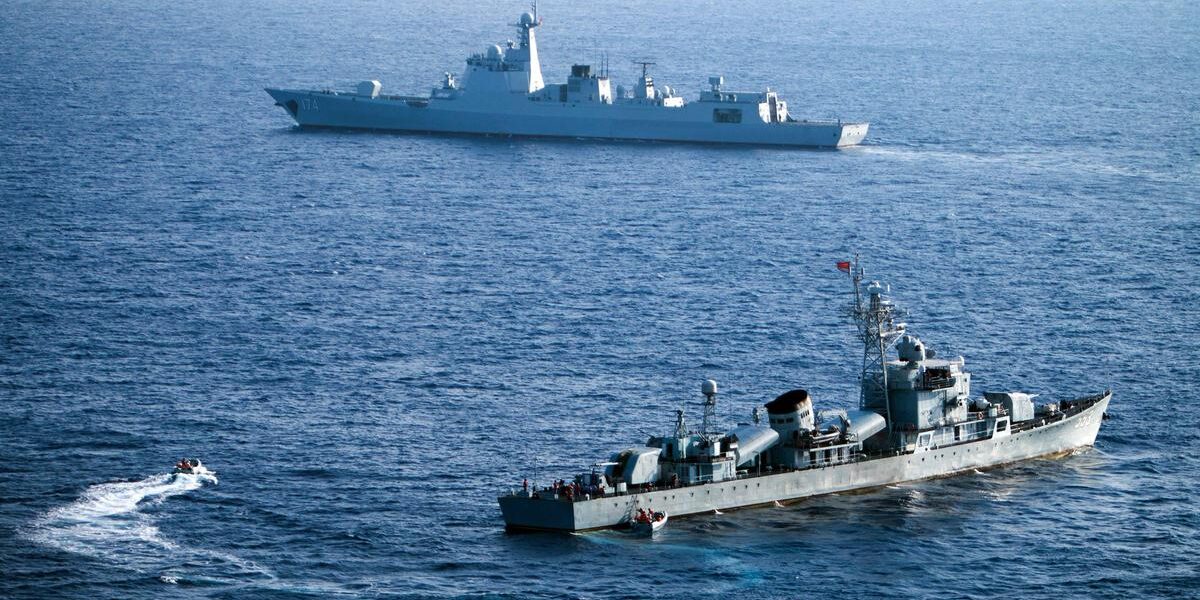
Introduction:
The Law of Sea is a branch which everyone equates with Maritime Law. This is because of the fact that the laws related to maritime are quite multifaceted. Often people get muddled that they both are equivalent. But if we see it from handy, we would then comprehend that both the branches work in dissimilar area. Maritime Law which is also known as Admiralty law has nothing to do with Law of Sea and they both work in different dimension. To point out the difference between Maritime Law and Law of Sea, it is said that the “Maritime Law is said to be Domestic whereas Law of Sea is International”.[1] The codification of Law of sea was done at United Nation Convention on the Law of Sea (in short, hereinafter referred to as UNCLOS).
Principle of Mare Liberum:
Before delving deep into paper, we will understand the meaning of the term “Mare liberum”. The principle of “mare liberum” is as long-standing as of Poverty. The principle means “Freedom of Seas” and in Literal meaning it means that the Sea is open to all nations. But is it really so? Is the Sea free? Is the Sea really open to common people and for the country? The credit for this very principle of Law of Sea which is “Mare Liberum” goes to Hugo Grotius. In simple words we can even say him the father of Mare Liberum. According to his view, the property of Sea belongs to no one, which is also known as res nullius. Hugo Grotius believed that the “Sea is free is free and everyone is free to use Sea”.[2] The importance and contribution of Hugo Grotius can never be forgotten as he was the first person to deal with the doctrine of freedom of Sea. He had even published his book titled “Mare Liberum” in the 16th century. His work is very appreciated till now. Grotius believed that “the Sea is so limitless that no one person can take possession of the Sea”.[3] Freedom of Sea includes “Freedom of Navigation”.
Conflict between Mare Liberum and Mare clausum:
As the law of sea is compound and old. There is a lot of conflicting things which keeps on revolving. And among all these, the most famous 2 conflicting principles are mare liberum and mare clausum. Often, students or professionals dealing with Admiralty law face this question in starting that whether sea is open to all or closed to all? And that is why to solve this difference, 2 principles came in force. And these are Principle of Mare clausum and mare liberum.
Often those who favor Mare Liberum assert that the Sea is common to all but that open to all and usage by all does not create the ownership of anyone. Whereas on the opposite side, there is Mare clausum, which is of the view that sea is closed and ownership can be claimed by a respective nation. But author is of the view that in the present time, none of the principle would work. If we want a good approach, then we will have to balance both of them. Complete freedom or Complete private dominion both are bad in spirits and bad for nations. Just because a nation has a fear in its mind related to its security interests, we can not implement Mare Clausum. Therefore, in no way we can say that the actions of China in extending the boundary of sea to gain more control is right from any angle. And on the other part providing and giving boundaries to any nation is not an easy task. Granting a specified area to nation is not an effective process.
Relevance of Concept of Mare Liberum in the present time:
The term “Mare Liberum” strictly states that the sea is common to all and shall be used by all. But the issue to be noted herein is that is it really so? Is the concept really being implemented in the present time. The author is of the view that this is a wrong presumption if we presume that the sea is being used and is common to all. As the concept itself is old and it dates back to 17th century. As there are a plethora of cases which reflect that the Sea is being exploited by some Nations. Now there are a lot of countries which are establishing their possession and control over the sea which is against the concept of Mare Liberum. The basic purpose for which this doctrine of Mare Liberum had came is not relevant in the present time in a complete manner.
The United Nations had already pointed out that “Territorial water” comes within ambit of Mare Clausum while High Sea comes within ambit of “Mare Liberum”
Disputes & Conflicts:
Everyone in the world is well aware of the attack of September 11, which is commonly known as 9/11. Though the attack is not directly linked with Admiralty Law, but it do affect the Same. We can even say that different countries were in process of making seas as their part. They were all focusing at the aim of grabbing sea so that they can have more right and control over sea. When any Nation claim its possession and sovereignty over the sea area then this claim is a violation of principle of Mare Liberum
Concept of Territorial Sea:
The principle of Territorial Sea says that, within its nautical miles, the state or the nation can exercise their control over it. But the author did not find this principle adequate as well. As it is limiting and restricting freedom of sea.
Instances of Sea dispute in past:
- Dispute of South China Sea:
The region of South China Sea still remains one of the most controversial dispute. The dispute is so complex because China demands extra percent of Sea area. South China sea mainly revolves around 2 islands, Paracel and Spratly islands. Many nations claim their right over this area. And their claims varies on many grounds. China is of the view that since they were using Sea as Navigational use and since they do have some evidence to prove their ownership on sea, their claim on ownership of Sea is accurate.[4] Thus we can ascertain that the claims which China is making over the territory of the sea is against the principles of “Freedom of Sea”. China had indeed violated the principle of Freedom of Sea in order to grab more and more control over the seas. An instance to show this is when China sent Note Verbale to United Nations to show his control and sovereignty over the territory of South China Sea.[5] China in greed of power and control is forcing other nations as well to acquire more sea area under its control. And this behavior of China has attracted everyone attention now as China is now on a mission to build more and more infrastructure there for military purposes. China is not respecting the principle of Mare Liberum and is imposing its sovereign laws over the International law. And the basis of claiming such area is “Nine-Dash line”, which too is not accountable and trustworthy.[6] Thus we can say that step by step China is building its Maritime area to have control over all Nations.
- Conflict on area of Arctic:
The area of Arctic ocean is also in dispute due to many countries claiming their portion on it.[7]
- Truman Proclamation of 1945:
One of the main Proclamation which is important in Law of Sea is the Truman proclamation of 1945. This Proclamation can be considered as the first step in which a right was asserted to a specific offshore resource area.[8]
Position in Constitution of India:
Article 297 of Indian Constitution: Article 297 is the only article dealing with Admiralty law.
Article 297 of The Constitution of India states that “All Lands, minerals and other things of value underlying the ocean within the territorial waters of India shall vest in Union and be held for purposes of the Union”.[9]
Conflict of provision of United Nations Convention on the Law of Sea:
United Nations Convention on the Law of Sea is considered as one of the biggest convention to resolve disputes. But what it says is not accurate. UNCLOS states that “Any country may claim area upto 12 nautical miles as their own territorial sea”[10]. But this can be misused and this area can be extended if any nation proves that their continental area extends further, then they would too have claim over that area.
Views and Opinions:
One of the important view is of professor at London Greenwich University. He says that “Most International law in relation to the high seas is virtually unenforceable”.[11]
Suggestions and Conclusion:
There is no doubt that, Hugo Grotius was a great International Lawyer who gave the most important topic of the “Freedom of the Sea”. But the point is, the concept is not relevant in the present times in the true sense and spirit. The concept of “Mare Liberum” not can not be fit in the current needs of nation. Thus the author calls for a transformation in the concept of “mare liberum” while considering the present needs. It is evident from many disputes which are taking place each day regarding possession of sea. An example for this can be set at China which is exploiting sea for his own benefit. It is all because of disputes due to which the concept of Mare liberum has lost its momentum. All the wars and battles have raised a question in each country mind that who owns sea?
Though a limit has been prescribed which is known as “Continental shelf” and in this 200 nautical miles area has been provided to each nation and the area which is given is specifically given for their own use. People of the nation can use the resources the way it want to. In this sense we can say that the Sea is free till area which is given as Continental shelf. But on the other hand, the area which is described as “High Seas” is not free because that area is beyond 200 nautical miles and no possession can be shown there by any nation.
Thus, author is of the suggestion that an attempt should be made to make the provisions of International law stringent and maximum permission should be imposed on those countries which are trying to divide sea. The issue with the present time is the extension of the territorial area by each nation and this is affecting the principle of Mare Liberum by limiting the amount of Free sea. Thus, the author concludes the paper by asserting that the principle of Mare liberum was not used at any time in the right and judicious manner as ages after ages nations were trying to establish their control over the Sea.
About The Author
Parul is a 4th year law student. She is doing her BA.LLB Course from Banasthali vidyapith University, Rajasthan. During this tenure, she has developed a great interest in Corporate and Maritime field.
Photo Credits:Scroll.in
References
-
Scott Krist, Maritime Law vs. Law of the Sea, (July. 17, 2017), https://www.houstoninjurylawyer.com/maritime-law-vs-law-sea/. ↑
-
Aristyo Darmawan, Indonesia and the Development of the Law of the Sea: Reflections on History, Scholarship, and Teachings, Afronomics Law, (Sept. 19,2020), https://www.afronomicslaw.org/2020/09/19/indonesia-and-the-development-of-the-law-of-the-sea-reflections-on-history-scholarship-and-teachings. ↑
-
Rachel Baird, Political and Commercial Interests as Influences in the Development of the Doctrine of the Freedom of the High Seas, QUT Law Review, https://lr.law.qut.edu.au/article/download/425/413/425-1-832-1-10-20121002.pdf . ↑
-
Nalanda Roy, Managing Conflict in Troubled Waters: The case of the South China Sea, https://rucore.libraries.rutgers.edu/rutgers-lib/40438/PDF/1/play/ ↑
-
Connor P. Donahue, Mare Imperium: The Evolution of Freedom of the Seas Discourse in U.S. Foreign Policy-An Addendum to Critical Security Studies Literature, https://vtechworks.lib.vt.edu/bitstream/handle/10919/100305/Donahue_CP_D_2020.pdf?sequence=1&isAllowed=y. ↑
-
Yusuke Saito, China’s Growing Maritime Role in the South and East China Seas, Center for a new American Society (2017), https://www.jstor.org/stable/pdf/resrep06118.pdf?ab_segments=0%2Fbasic_search_gsv2%2Fcontrol&refreqid=fastly-default%3A81e5f0f960c143fac1d36bb1459b2b03. ↑
-
Emma Bryce, Who owns the Arctic, (October 13, 2019), Live Science, https://www.livescience.com/who-owns-the-arctic.html ↑
-
Laura Hugh, The Truman Proclamation and the Rule of Law, (September 28, 2016), Rule of Law, https://www.ruleoflaw.org.au/truman-proclamation-rule-law/. ↑
-
Article 297, Constitution of India, ↑
-
Ocean Governance: Who owns the Ocean? (June. 2, 2017), https://www.boell.de/en/2017/05/30/ocean-governance-who-owns-ocean . ↑
-
Vanessa Baird, Who owns the Sea, (September 17, 2019), New Internationalist, https://newint.org/features/2019/08/14/big-story-oceans-who-owns-sea ↑




